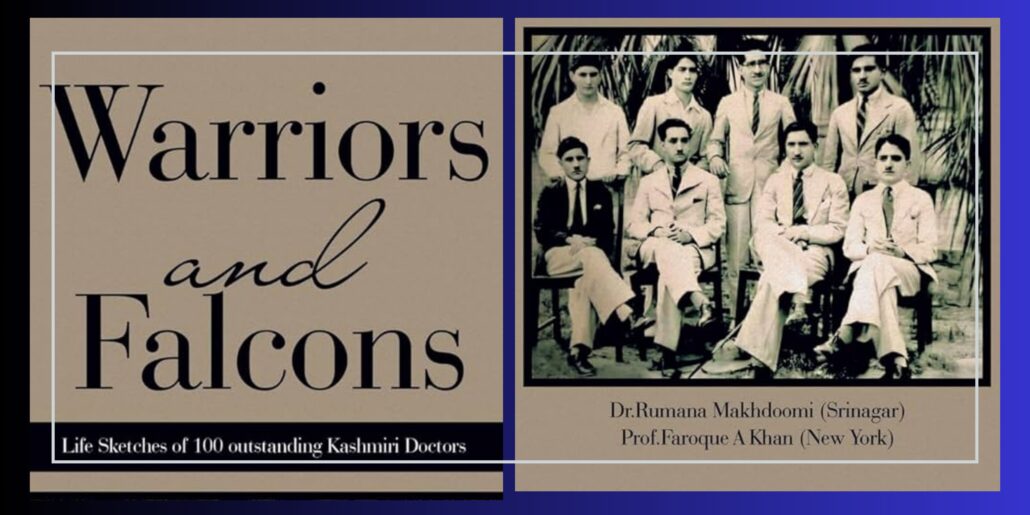
The book ‘Warriors and falcons: Life sketches of 100 outstanding Kashmiri doctors’ is a collaborative effort of Dr. Faroque A. Khan (New York) and Rumana Makhdoomi (Srinagar) showcases the profound impact of individual doctors but also highlights their ability to influence entire healthcare systems through a sense of purpose and commitment to community service.
The establishment of institutions like Government Medical College and Sher-i-Kashmir Institute of Medical Sciences (SKIMS) against significant odds stands as a testament to the vision and perseverance of leaders like Dr. Ali Jan. Upholding these legacies is crucial as they serve as wellsprings of inspiration.
Released in September 2023, the preface of the book eloquently underscores the pivotal role played by the 100 distinguished individuals featured in the book in shaping modern healthcare in Kashmir.
These individuals replaced superstition with science, adopted rational approaches, and demonstrated unwavering dedication to community service in the face of significant challenges. Their commitment not only serves as an inspiration but also sets a profound example for present and future generations of healthcare professionals.
The analysis of disease epidemiology, treatment innovations, and the outcomes of public health policies provides a blueprint for informing future best practices.
“Warriors and Falcons” illuminates the poignant stories of Kashmiri physicians who triumphed over personal and societal challenges to deliver exceptional healthcare and lay robust foundations despite formidable odds. The book, organized into sections such as The Legends, The Pioneers, The Flag Bearers, The Path Breakers, and Tributes, offers insightful profiles spanning about a century of modern Kashmiri medical history.
The Legends section pays tribute to physicians like Dr. Ali Jan, renowned as Kashmir’s most popular and influential clinician, whose enduring legacy includes unwavering commitment to patients and instrumental contributions to institutions like SKIMS. Other legends, such as Dr. Gwash Lal Kaul, Dr. Girja Dhar, and Dr. Hafizullah, were pioneers who introduced modern medicine to Kashmir, overcoming resistance.
The Pioneers section acknowledges figures like Dr. GM Dhaar, a community health advocate, and Dr. Sheikh Abdul Ahad, whose contributions were crucial to the growth of ENT as a specialty. Pioneers like Dr. Mushtaq Ahmed Margoob in psychiatry and Dr. Ghulam Nabi Kozgar in specialized eye care catalyzed rapid advancement.
The Flag Bearers section documents the careers of master clinicians and surgeons like Dr. Mahmooda Khan and venerable teachers like Dr. GQ Allaqaband. Researchers like Dr. MS Khuroo and Dr. Abdul Hamid Zargar brought global recognition to Kashmiri medicine. These flag bearers signify the maturation of medicine in Kashmir.
The Path Breakers section profiles physicians like Dr. Nancy Khardori, introducing specialized care in genetics, and Dr. Suhail Shah, a pioneering hospitalist. Dr. Rafit Hassan’s cancer research at the NIH broke new ground. These physicians, though dispersed globally, carry forward their Kashmiri roots, driving their passion to advance medicine.
“Warriors and Falcons” goes beyond a mere compilation of accomplishments; it offers poignant insights into the sociocultural fabric of Kashmir interwoven into the stories of exceptional physicians.
It chronicles the maturation of medicine in the valley through periods of conflict and turmoil. Peacebuilders like Dr. Upendra Kaul serve as beacons of compassion and unity, contributing to healing broken communities. The underlying theme is the enduring Kashmiri pride and esprit-de-corps that unifies this medical fraternity.
This invaluable book addresses a crucial gap in recording the history of modern Kashmiri medicine over the past century.




